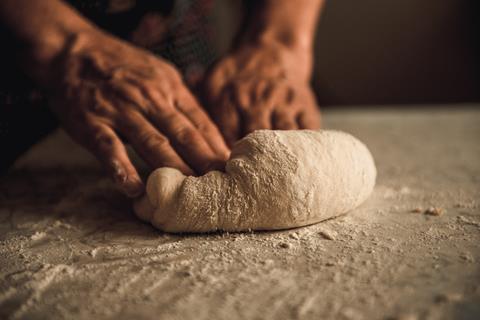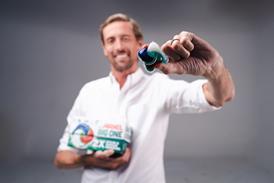C-stores are making sure they keep their bread and bakery customers happy with a range that focuses on both local and value lines.

Ever seen that iconic 1970s Hovis ad with a cheeky Northern scamp delivering bread on his bike? If they filmed that today not only would he be on a Segway (and in a Deliveroo uniform to boot) – he’d need a bigger basket, too.
In 2020 Brits have appetites that go beyond your traditional loaf. They’re bonkers for all kinds of bakery products, from posh pain through protein-enhanced bagels to gluten-free cakes and croissants.
“Pre-packed bread continues to dominate overall sales in the £3.5bn bread market, but consumers are trading up to more premium and exciting options including seeded bread and bread with bits (Mintel Bread Report 2019),” says Jeremy Gilboy, founder, St Pierre Groupe.
“Consumers also buy a variety of breads with almost half (49%) buying four or more types and just 15% buying only one (ibid).”
Yet in the race for innovation and variety, is there a danger that the industry has lost sight of the core convenience shopper?
Stuart Cordner from Cordner’s Comber Road Supermarket in Dundonald, Belfast, thinks there could be.
“Bread is a really big market for us, but I think that in bakery we’ve got too many suppliers doing too many different things at the moment,” he says.
“Over the years they’ve constantly added and added to what’s available in their lines. Now that’s great, but I think that it’s being led somewhat by the suppliers – and not necessarily what the customer actually wants. In all that noise I think that good opportunities sometimes get missed.”
Stuart says that bread accounts for 11% of his total store sales so he’s keen not to throw the baby out with the bath water by losing key lines. However, he says that it’s important that all stores make sure they’re focused 100% on the customer, rather than chasing new trends.
For him that’s meant forging strong relationships with local suppliers. “We focus on having two ‘hero’ local bakeries that make deliveries to us,” he explains.
“Don’t get me wrong, customers can definitely come in and get their Kingsmill fast if they need it. But they can also get local bakery products that provide something a bit different. We make a feature of that difference everywhere on our shelves. We don’t merchandise by category, we merchandise by supplier.”
Selling the local story
Stuart takes time to highlight the local angle by including shelf cards to big up his bread. The fact that his store isn’t just about distress gives him a bit of space to tell the story around these suppliers, which he says customers love.
In bakery, bread has always been a classic c-store staple. It’s a central footfall driver that’s bought by 96% of UK consumers (Mintel 2019) and retailers know that when they buy a loaf shoppers are likely to splurge on other top-up items, too.
It’s a powerful signpost for quality and freshness within a store. And so by choosing the right lines, retailers can re-position how their shop is seen by customers. For example, manager Debbie Deeley has chosen some local suppliers for bread to signify the high quality fare she offers at Spar Heskin in Lancashire. “The only bread we do ourselves now on a bake-off is French sticks,” she explains.
“We buy in a lot from our local suppliers who can do deliveries. It’s what you might call speciality bread: the cheese bread and golden grain loaves. They go down really well with our customers.
“People know and recognise the local suppliers. Also I’ve been trying to position us as more of a farm shop and that helps us. I think that people are coming to us looking for something a bit different that’s not another sliced loaf.”
Stuart agrees that it’s the more exciting varieties of bread that are driving sales in-store. “One of the big trends for us is continental breads, or what I call ‘breads of the world’,” he says, “so that’s the New York Deli bagels, pain au chocolat, brioche and wraps. They’re the things that do really well for us.”
Stepping away from the higher end for a second, you can’t deny that sometimes all consumers want is a decent loaf at the right price. That’s especially true for thrifty students.
“For us it tends to be all about the good quality budget bread,” says Rachel Fletcher from The Village Store at the University of Sheffield. “It’s such an everyday product and people come in just to get it. It’s popular because there’s so much you can do with a loaf, like beans on toast. Students can create a simple meal and they want the convenience of not having to go very far to get it.
“With that in mind, our most popular bakery product is the Co-op sliced brown loaf. We used to do that and a brand, but the price differential was just too much for our customers in the end.
“However, we’ve found that one thing that students will definitely pay more for is the brioche buns, which we do pre-packed.“
Rachel points out that, however budget-conscious your customers, bread has to be fresh. She gets deliveries three times a week and it has to be sold fast.
This can cause problems. After all, there are plenty of times when students and staff are off on holiday, which can cause havoc with waste on fresh products. Luckily, Rachel has found some smart ways to stay on top of it. “We’ve started doing some long-life bread, just to keep the category ticking over.” she says. “Plus, there’s lots of other similar bakery products we can offer that have a longer life than normal loaves, like wraps and pitta breads. They help us stay ahead.”
St Pierre Groupe’s Baker Street bread uses an “ultra-clean” packing process in order to protect products from micro-organisms and guarantee a longer shelf life. The brand reported 10% sales value growth to the end of 2019 (internal sales data to 52 weeks to 31 December 2019) and Baker Street loaves have also become the fastest growing bread brand in the impulse sector top 10 (Nielsen Sliced Breads Top 10, Impulse Category 52 weeks to 13 April 2019).
Keep it fresh
For stores with variable footfall, packaged could beat fresh in the sales and wastage stakes.
Brioche Pasquier is a familiar brand in packaged bakery (especially since grocer turned gourmand Greg Wallace paid them a visit in his Inside the Factory show last August). Specialising in croissants, pain au chocolat and brioche rolls, it also offers on-shelf longevity.
“Our baked products have a shelf life of 21 days which means that storekeepers and consumers can keep wastage to a minimum,” says Brioche Pasquier sales manager Matthew Grenter.
But hang on – what about health? There’s in-store evidence that, like butter and other ‘natural fats’, carbs are making a comeback since the Atkins Diet effect.
“There’s definitely a perception of health around some of our bakery products,” reckons Stuart.
“People certainly see bagels as a healthy choice, so we do really well with them in January when everyone’s on a diet. We also do the ‘thins’ too, which customers cutting down on calories also like.”
Don’t forget gluten-free either. Once a niche, it’s grown into a big-hitting sector for c-stores. Says Stuart: “Gluten-free is huge for us. I think that when customers shop they don’t expect to find bread in the ‘gluten-free’ section. They want to find it in with the ‘normal’ bread. We’re working towards that at the minute with our refit.”






















No comments yet